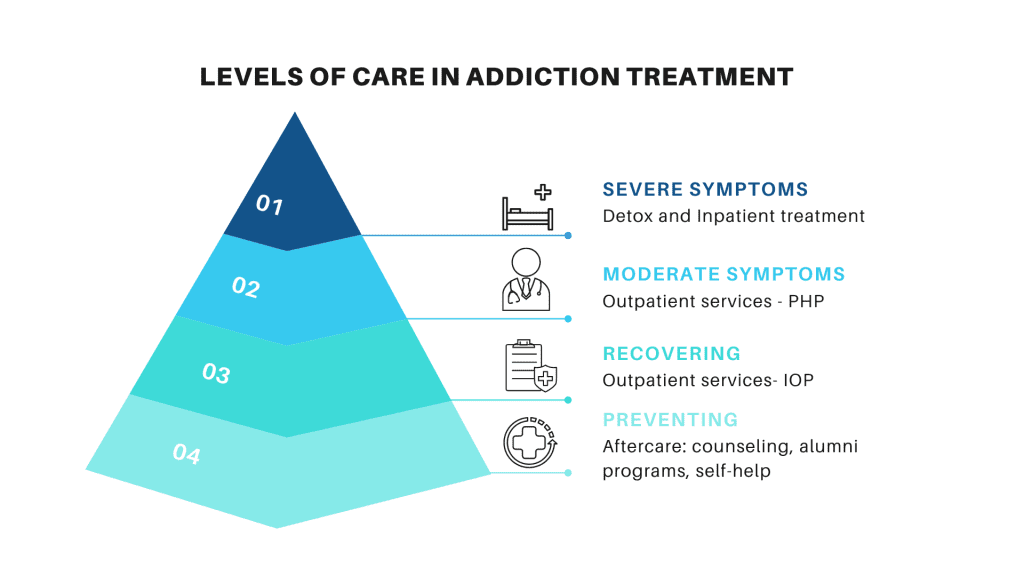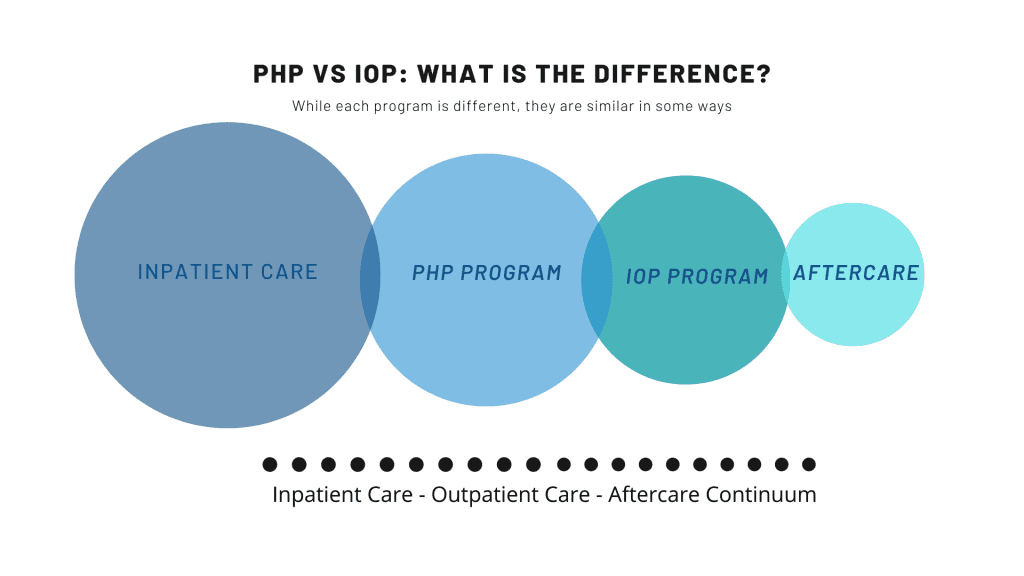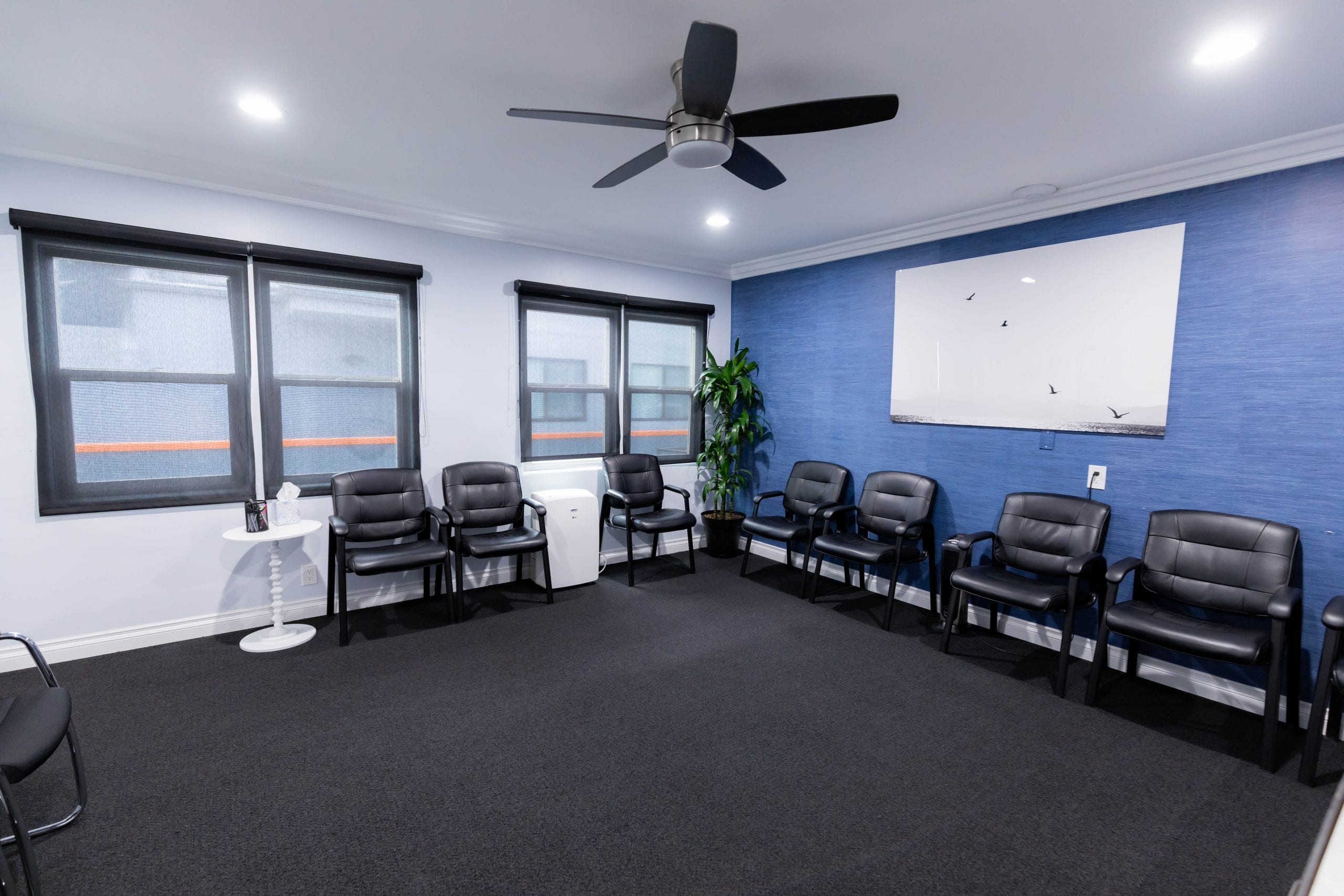Day Treatment Program or PHP Therapy
Summary: A Partial Hospitalization Program (PHP), also known as a day treatment program, provides structured, intensive outpatient mental health and addiction treatment for individuals who need a higher level of clinical support than an Intensive Outpatient Program (IOP) but do not require 24-hour inpatient care. PHP therapy typically involves 5 to 6 hours of programming per day, 3 to 5 days per week, and includes individual therapy, group therapy, psychiatric evaluation, medication management, and evidence-based modalities such as CBT, DBT, and ACT. PHP serves individuals stepping down from inpatient or residential treatment as well as those whose symptoms require more comprehensive daily support than IOP provides. Overland IOP offers a top-rated Partial Hospitalization Program in Los Angeles at 3415 Overland Ave, Los Angeles, CA 90034, treating depression, anxiety, PTSD, bipolar disorder, substance use disorders, dual diagnosis, and co-occurring conditions. Both in-person and virtual PHP programs are available, with morning, afternoon, and evening scheduling tracks. Most major insurance plans are accepted, and admissions is available 24/7.
Day treatment programs or partial hospitalization programs (PHP) or PHP therapy are the next step down from inpatient treatment and a step up from intensive outpatient programs (IOP). In most mental health day treatment programs, patients spend several hours each day at the treatment facility.
PARTIAL HOSPITALIZATION PROGRAM OR PHP THERAPY
Patients tend to directly enter into PHP after completing their detoxification or inpatient treatment. In most cases, PHP requires the patient to be available for treatment on a daily basis. The main difference is that more of the patient’s time is required each day compared to the IOP. PHP usually last about 5-6 hours per day, 3-5 days per week.
PHP programs have significant amounts of individual and group therapy where they are taught better coping mechanisms to deal with their stress as alternatives to turning to alcohol and drug abuse for solace or self-medication. It is with regard to that PHP is sometimes referred to as day treatment, to capture the idea that a patient will be receiving care on a nearly full-time basis during the day and allowed to go home in the evenings.
In addition, more supervision, including the monitoring of psychiatric symptoms and intake of medication, is associated with PHP than with IOP, but this is also subject to your insurance coverage limit, which could determine the range of services that you will receive.

Day Treatment Schedule
Day treatment programs are ideal for people needing a high amount of support and structure but able to live at home and benefit from community interaction. PHP is ideal for clients who do not need 24/7 care and inpatient treatment. PHP programs vary greatly but in general include the following:
- Participants live at home or in sober or transitional living accommodations.
- Attend 25 or more hours of programming per week. 5-6 hours per day, 3-5 days per week.
- Programs are generally 4-6 weeks
- Curriculum often includes 1-on-1 therapy, group therapy, family therapy, clinical diagnosis, vocational/academic training, substance abuse counseling, and alternative therapies.

PHP THERAPY VS IOP: WHAT IS THE DIFFERENCE?
While the recovery journey is different for every person, there are levels of treatment for each problem, depending on how severe the symptoms are:
The difference between an IOP and a PHP is subtle but important. The program that’s right for you will depend on many factors, including whether you’ve been in treatment before and whether you have a strong support system at home. The most important difference between IOP and PHP is that
- PHP therapy usually lasts about 5-6 hours per day, 3-5 days per week.
- IOP therapy usually lasts approximately 3-4 hours per day, 3-5 days a week.
If you’ve been through inpatient treatment recently and you’re looking for the next step in your recovery journey, a PHP could be the ideal next step.
If you experience moderate mental health or addiction problems, IOP treatment might be sufficient as a first step on your recovery journey.
Reading to discover the difference between PHP and IOP addiction treatment is important, but always consult with the doctor for an initial assessment so that your physical and mental health situation can be effectively gauged.

IS PHP THERAPY RIGHT FOR YOU?
Whether a PHP day treatment is right for you depends on your stage of the recovery and healing process.
If you’ve been through inpatient treatment recently and you’re looking for the next step in your recovery journey, a PHP could be the ideal next step.
If you experience moderate mental health or addiction problems, IOP treatment might be sufficient as a first step on your recovery journey.
Living in a partial hospitalization treatment facility instead of at home creates a more significant treatment experience. Even though you’re undergoing treatment during the day in another program—under constant supervision—once you get home, you’re no longer supervised. Such circumstances can make it tough to stay sober, strong, and healthy and maintain gains.
PHP treatment is designed to bridge the gap between residential treatment and home but may also be appropriate for people who do not need a residential level of care.

If you need FREE help, please contact the National Helpline about mental and/or substance use disorders, prevention, treatment, and recovery in English and Spanish.
FAQs About Partial Hospitalization Program (PHP)
Q1: What is a Partial Hospitalization Program (PHP) and how is it different from day treatment?
A Partial Hospitalization Program (PHP) and a day treatment program are the same level of care — the terms are used interchangeably across the behavioral health field. Both refer to a structured outpatient treatment model that provides 5 to 6 hours of clinical programming per day, 3 to 5 days per week, without requiring the patient to reside at a treatment facility. Patients attend therapy during the day and return home in the evening. The term “day treatment” captures the idea that a patient receives care on a nearly full-time basis during the day, while “PHP” is the clinical and insurance designation for this level of care. According to the Substance Abuse and Mental Health Services Administration (SAMHSA), partial hospitalization is an evidence-based treatment model that provides intensive clinical support while allowing individuals to maintain community connections and daily responsibilities.
Q2: What is the difference between PHP and IOP?
The most important difference between PHP and IOP is the intensity and duration of daily treatment. PHP therapy typically lasts 5 to 6 hours per day, 3 to 5 days per week, providing a higher level of clinical structure, more frequent provider contact, and closer monitoring of psychiatric symptoms and medication. IOP therapy typically lasts 3 hours per day, 3 to 5 days per week, and is designed for individuals who need consistent clinical support but can manage daily responsibilities with less intensive programming. PHP is generally appropriate for individuals stepping down from inpatient or residential treatment, while IOP may be sufficient as a first step for individuals with moderate mental health or addiction symptoms. Both programs at Overland IOP include individual therapy, group therapy, psychiatric evaluation, medication management, and evidence-based therapeutic approaches.
Q3: What is the difference between day treatment and IOP?
Day treatment (also called PHP) and IOP differ primarily in the number of hours of clinical programming per day and the overall intensity of care. Day treatment programs require approximately 5 to 6 hours of structured treatment per day, while IOP requires approximately 3 hours per day. Day treatment includes more supervision, more frequent psychiatric monitoring, and a broader range of therapeutic services within each treatment day. Day treatment is ideal for individuals who need a high level of support and structure but are able to live at home, while IOP is better suited for individuals whose symptoms are moderate or who have already stabilized through a higher level of care. The National Institute of Mental Health (NIMH) recognizes multiple levels of outpatient care as effective treatment options depending on the severity and stage of an individual’s condition.
Q4: Who should consider a Partial Hospitalization Program for addiction in Los Angeles?
An addiction Partial Hospitalization Program in Los Angeles is appropriate for individuals who need intensive, structured treatment for substance use disorders — including alcohol addiction, opioid addiction, methamphetamine addiction, cocaine addiction, and prescription drug addiction — but do not require 24-hour inpatient supervision. PHP is particularly suited for individuals completing detoxification or stepping down from residential treatment who need continued daily support to prevent relapse and stabilize recovery. It is also appropriate for individuals with co-occurring mental health and substance use disorders (dual diagnosis) who benefit from integrated treatment addressing both conditions simultaneously. Overland IOP’s addiction PHP in Los Angeles provides evidence-based therapy, medication management, relapse prevention planning, and peer support in a structured daily format at 3415 Overland Ave, Los Angeles, CA 90034.
Q5: What does a mental health Partial Hospitalization Program in Los Angeles include?
A mental health Partial Hospitalization Program in Los Angeles at Overland IOP includes 5 to 6 hours of daily clinical programming that combines individual therapy, process-oriented group therapy, psychoeducation, psychiatric evaluation, and medication management. Treatment addresses depression, anxiety disorders, PTSD, bipolar disorder, personality disorders, dual diagnosis, complex trauma, and other behavioral health conditions. Therapeutic modalities include Cognitive Behavioral Therapy (CBT), Dialectical Behavior Therapy (DBT), Acceptance and Commitment Therapy (ACT), psychodynamic therapy, and Solution-Focused Brief Therapy (SFBT). Programs typically run 4 to 6 weeks, with treatment length adjusted based on individual clinical progress. Morning, afternoon, and evening tracks are available to accommodate a range of personal and professional schedules.
Q6: Where can I find a Partial Hospitalization Program in Los Angeles?
Overland IOP provides a top-rated Partial Hospitalization Program at 3415 Overland Ave, Los Angeles, CA 90034, offering both in-person and virtual PHP for mental health and addiction treatment. The program includes morning, afternoon, and evening scheduling tracks, individual and group therapy, psychiatric evaluation, medication management, and evidence-based therapeutic modalities. Overland IOP treats depression, anxiety, PTSD, bipolar disorder, substance use disorders, co-occurring conditions, and other behavioral health concerns. Most major insurance plans are accepted, including Aetna, Cigna, UnitedHealthcare, Blue Shield of California, Kaiser, TRICARE, and SAG-AFTRA. The admissions team is available 24/7 at (800) 530-3100 to verify insurance, answer questions, and begin the intake process. Treatment can start as soon as the same day.
Q7: Does insurance cover PHP in Los Angeles and throughout California?
Most major insurance plans cover Partial Hospitalization Programs, including Overland IOP’s in-person and virtual PHP. Federal and California state mental health parity laws — including the Mental Health Parity and Addiction Equity Act (MHPAEA) — require insurers to cover mental health and substance use treatment at parity with medical and surgical benefits, which includes PHP-level outpatient care. Overland IOP accepts Aetna, Cigna, UnitedHealthcare, Blue Shield of California, Kaiser, TRICARE, SAG-AFTRA, and other major providers. Virtual PHP is available to individuals throughout California, removing geographic barriers to accessing intensive outpatient treatment. Overland IOP’s admissions team verifies insurance coverage and explains benefits before treatment begins so patients understand their financial responsibility upfront.

PHP vs IOP Programs at Overland
Overland is the top-rated mental health, addiction, and codependency treatment center in Los Angeles, California. We provide IOP, PHP programs, in-person and virtual care (telehealth services), hybrid treatment plans. Our mental health treatments include depression treatment, anxiety treatment, dual diagnosis treatment, PTSD treatment, personality disorder treatment, mood disorder treatment, and complex trauma treatment. Our addiction treatments include alcohol addiction treatment, heroin addiction treatment, prescription drug treatment, meth treatment, cocaine treatment, sex addiction treatment, & gambling addiction treatment. Contact Overland IOP today via phone, live chat, contact forms, or email! We work 24/7 and provide in-person, virtual care (telehealth services), and hybrid treatment plans. Our IOP and PHP programs offer morning, afternoon, or evening options. Start your treatment as soon as the same day!
Published: October 01, 2021

Published: February 14, 2026
Medication-Assisted Treatment (MAT): How It Works?
Summary: Medication-assisted treatment (MAT) is an evidence-based approach to addiction treatment that combines FDA-approved medications with behavioral therapy and counseling to treat substance use disorders — primarily opioid and alcohol addiction. MAT is endorsed by the Substance Abuse and Mental Health Services Administration (SAMHSA), the National Institute on Drug Abuse (NIDA), and the World Health […]
Read more
Published: February 06, 2026
Talk Therapy: Types, Benefits & How It Works in California
Summary: Talk therapy — also known as psychotherapy — is a structured, evidence-based treatment approach in which a trained mental health professional helps individuals identify, understand, and change the thoughts, emotions, and behaviors that contribute to mental health conditions and substance use disorders. It is the foundation of treatment for depression, anxiety, PTSD, personality disorders, […]
Read more
Published: January 27, 2026
What Is DPD? Understanding Dependent Personality Disorder
Most people don’t ask, “What is DPD or Dependent Personality Disorder?” They come in feeling drained, anxious, and stuck in relationships that feel restrictive yet hard to leave. Being alone feels unsettling. Decision-making feels paralyzing. Reassurance becomes a daily necessity rather than a comfort. At Overland IOP in Los Angeles, we often see Dependent Personality […]
Read more
